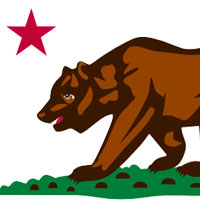Intensity Gap
Dem Convention Seeks Ways of Fighting Back Against Tea Party Passion
As California Democrats met over the weekend to rally their spirits for the 2010 campaign, party chair John Burton offered a one-word, secret strategy to increase voter turnout in November:
Pot.
Burton, the eccentric and irascible 77-year-old Democratic leader, offered the idea when asked how the party would motivate younger voters. Their backing was key to Barack Obama’s presidential election, and getting them to go to the polls this year could be crucial to a ticket led by 72-year-old Jerry Brown as the candidate for governor and 69-year-old Barbara Boxer, seeking reelection to the U.S. Senate.

As Democrats face the most unfriendly political landscape in memory, reshaped in part by the anti-government passions of the conservative Tea Party movement, Burton pointed to a November ballot initiative that would legalize and tax marijuana in California as key to the party’s success in the effort.
“Pot, pot,” he told a surprised Joe Garofoli, political reporter for the San Francisco Chronicle, who first raised the question. “Yes, they’ll come out on pot … That will turn out people.”
With all of his major candidates opposing the pot proposition, Burton’s unconventional political prescription seems unlikely to make its way onto TV ads and mailers for mainstream Democrats. Still, his answer was aimed at addressing the central question that preoccupied 3,000 activists at the weekend affair at L.A.’s JW Marriott Hotel: how to gin up intensity among their voters to head off what polls now suggest could be a major Republican comeback in the mid-term elections, just two years after Democrats won the presidency and both houses of Congress.
“At this point, I think the polls are showing that there is more enthusiasm with the Tea Party (movement),” Senator Boxer candidly told reporters, in a comment echoed by a host of other speakers throughout the convention, “and I think it is absolutely a fact that we have to match that enthusiasm.”
Boxer was met with considerable enthusiasm when she spoke to delegates, striking a populist tone that called on Democrats to oppose “Wall Street on steroids” and campaign aggressively on just-passed health-care reform, proposals for development of a statewide green energy industry, and an end to (unspecified) tax breaks for the wealthy and big business.
While Boxer’s mostly left-of-center views align with the liberal activists who dominated the convention, Attorney General Brown faced a more daunting challenge. Without opposition in his latest bid for the party’s nomination, and having already served as governor from 1975 to ’83, Brown has kept a very low profile in the campaign to date, falling behind Republican front-runner Meg Whitman in independent public-opinion polls.
Having failed to generate much buzz among Democrats, despite his historic effort to become the first candidate in history to win the governorship twice in a lifetime, he also has frustrated many progressives by all but ruling out any new taxes and echoing conservative complaints about too much government regulation creating an anti-business climate in the state.
Seeking to energize the most active members of the Democratic base, Brown therefore made an unconventional proposal of his own: He called on GOP rivals Whitman and Steve Poizner to join him in an unprecedented series of three-way bipartisan debates in advance of the parties’ primaries.
“Come out from behind those glittering poppy fields, those beautiful car crashes on top of the mountain,” Brown said, referring to recent TV ads from the Republican wannabes. “This is going to be mano a mano, one candidate against the other. Let’s hear the different ideas.”
While the outcome of Brown’s surprising proposal was foreordained — Whitman, sitting on a big lead, promptly declined while Poizner, desperate to catch up, promptly accepted — it enabled him to capture the news cycle coming out of the convention, and it got delegates talking, if not fired up. It also pushed Whitman into a defensive posture, underscoring the tightly controlled nature of her campaign, a hugely expensive effort that has been heavy on TV ads and light on unscripted public appearances.
“A candidate for public office should not act like a used-car salesperson who relies on misleading TV ads,” Brown said after Whitman’s refusal. “We cannot delay debating solutions. The need is immediate, and millions and millions of dollars in an orgy of spending for TV commercials is not a substitute for an honest and open discussion.”
We shall see.
WIN FOR WILLIAMS: As expected, S.B. City Councilmember Das Williams officially won the endorsement of the state Democratic Party. The endorsement became pro forma after Williams earlier defeated party rival Susan Jordan in voting among delegates in Ventura and Santa Barbara counties.



